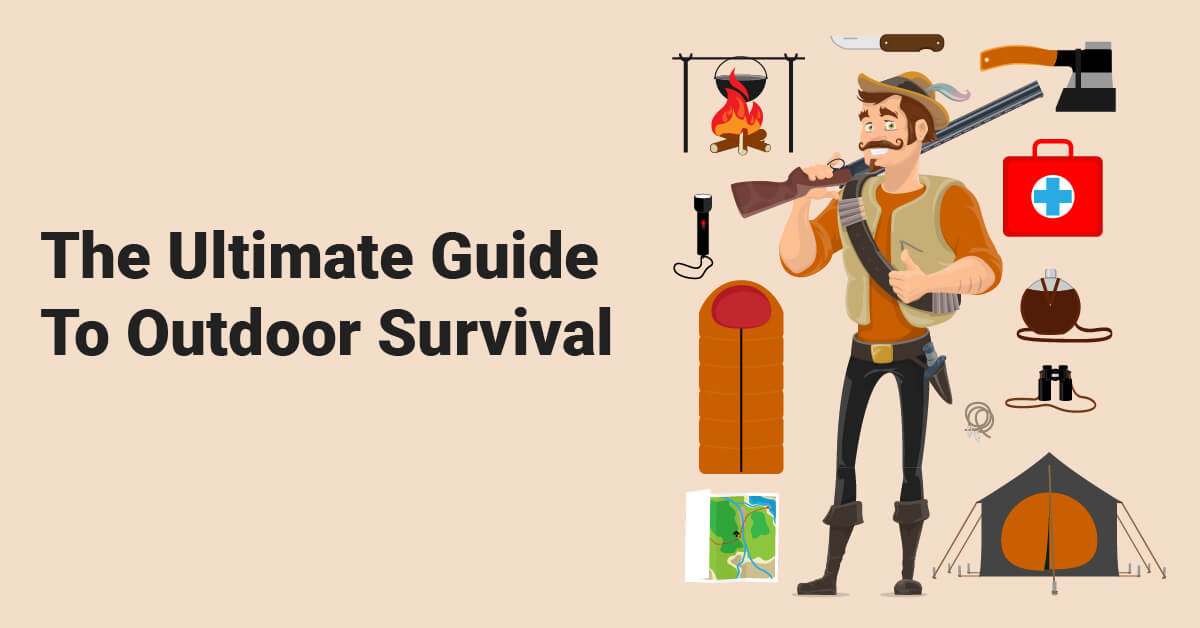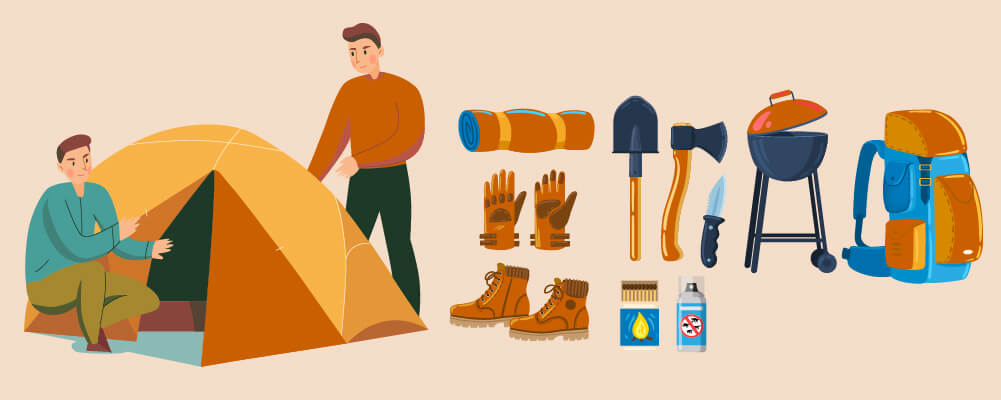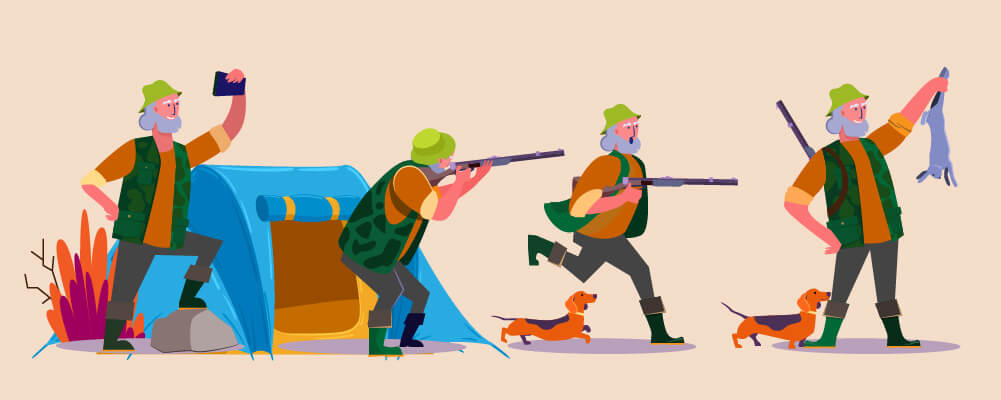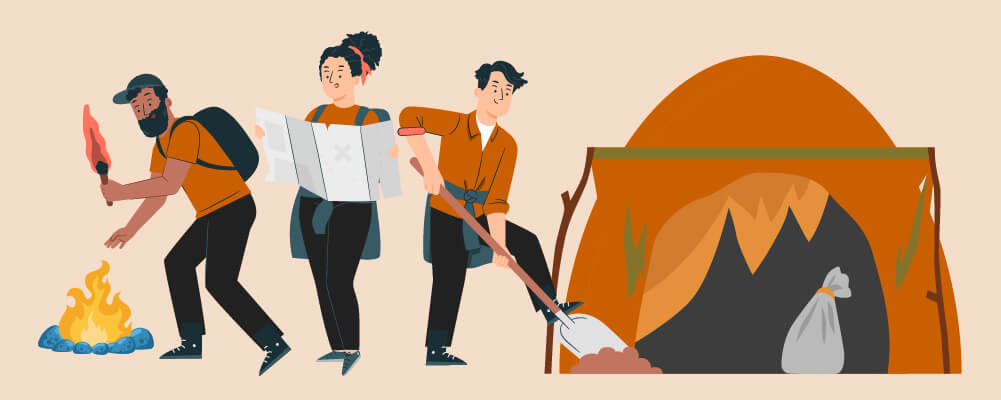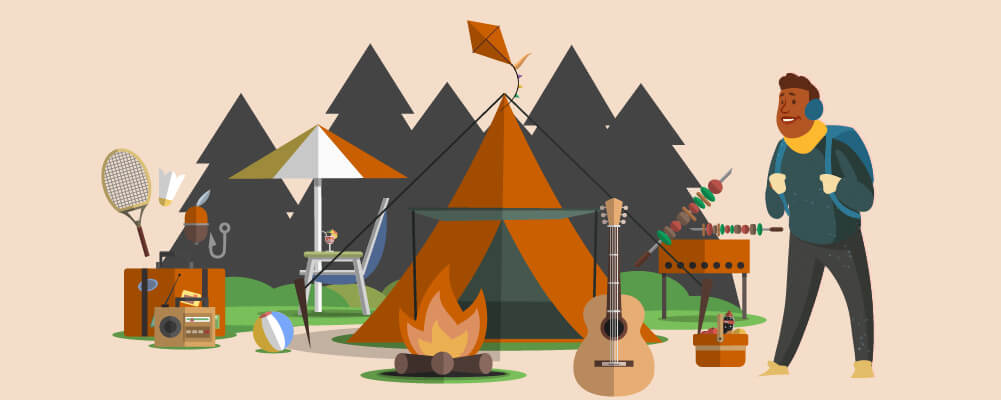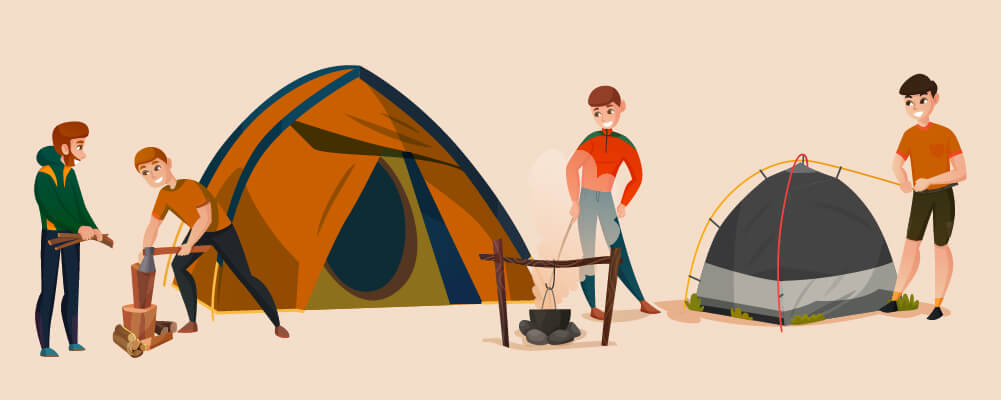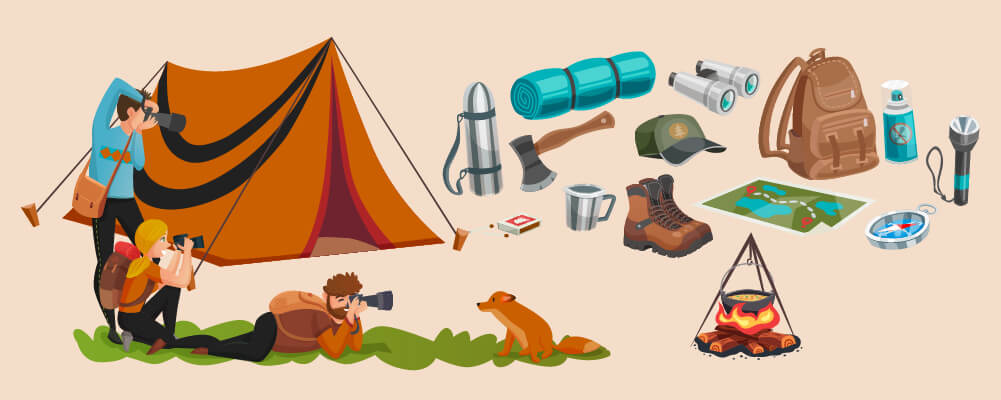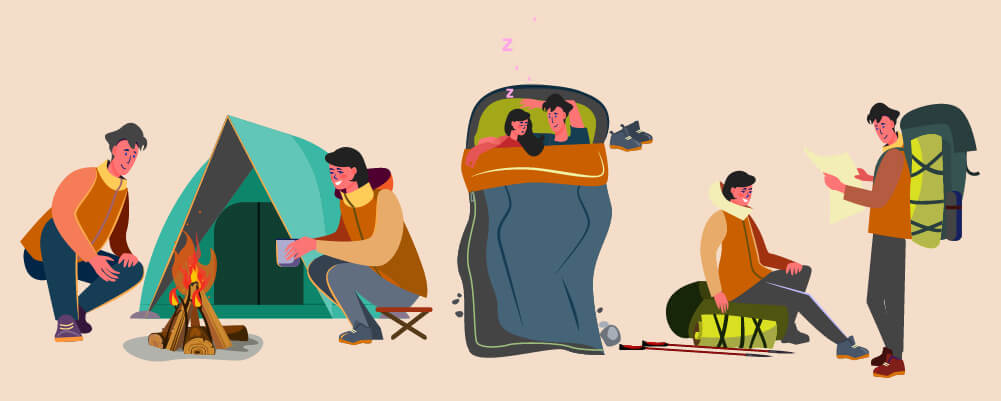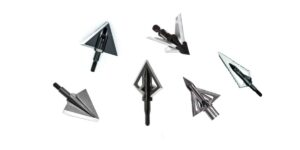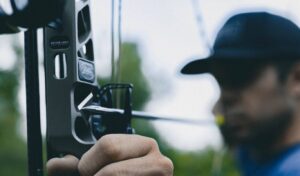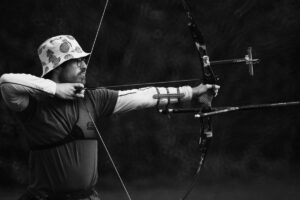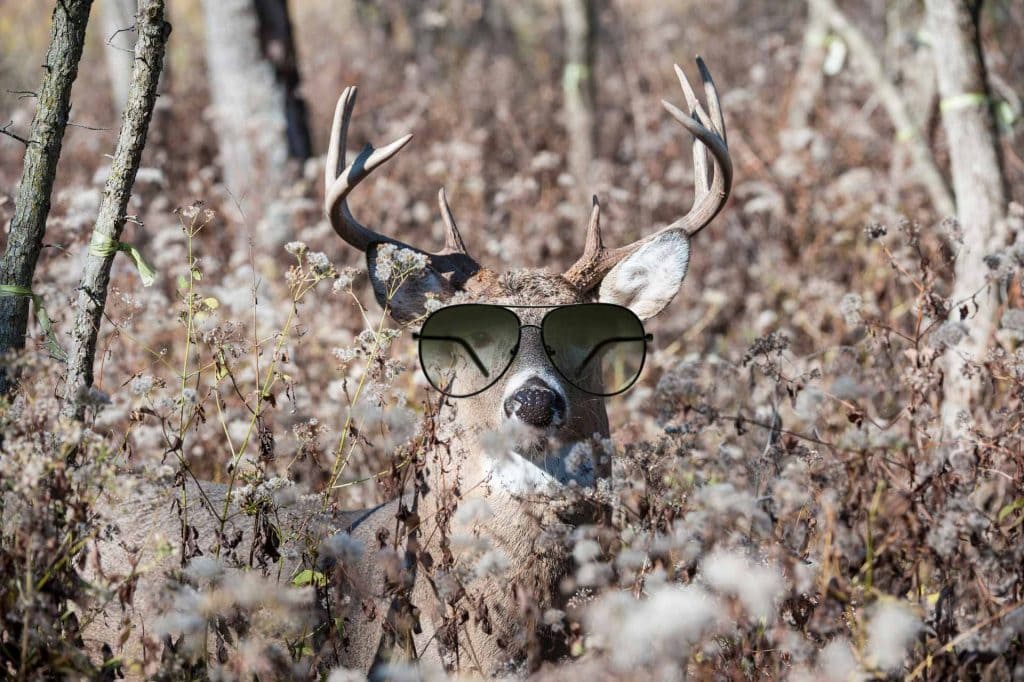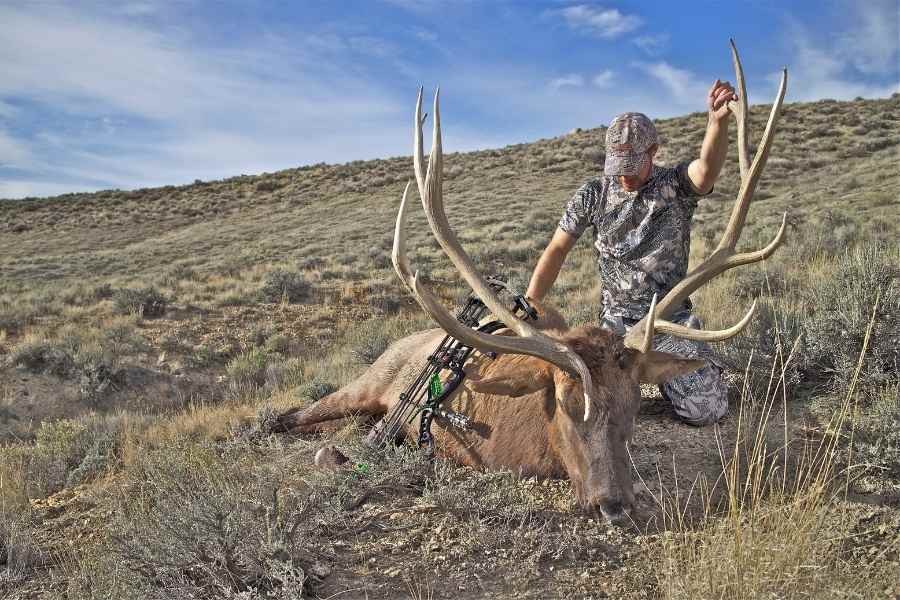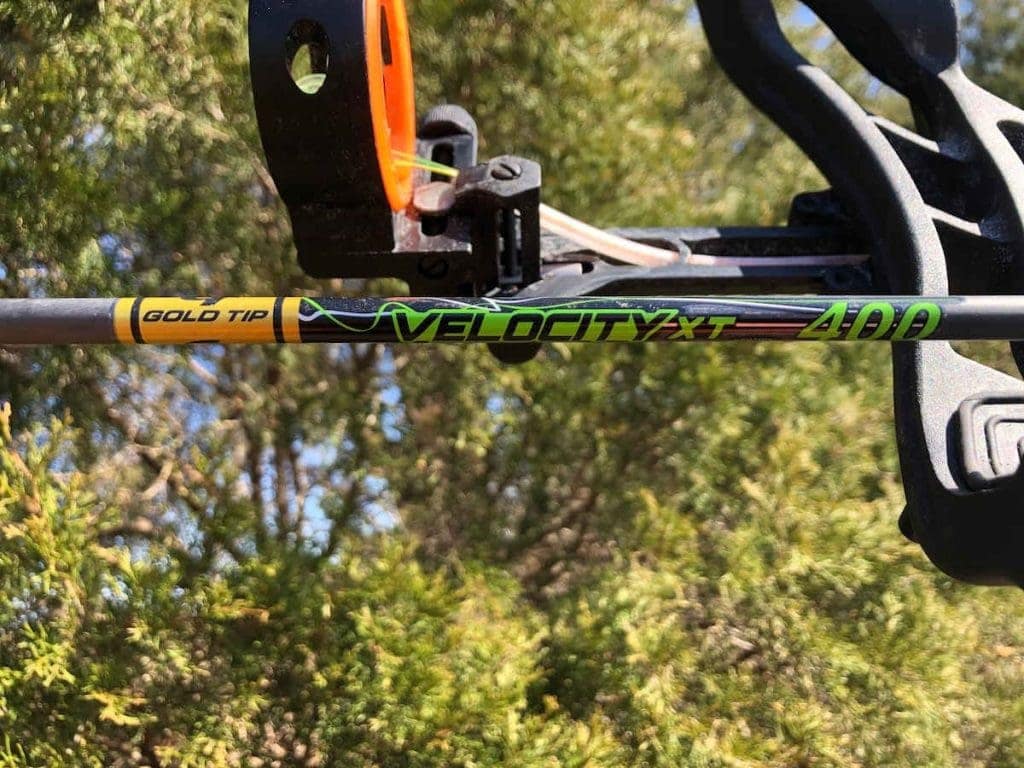Everything You Need To Know About Hunting And Surviving In The Wild
Hunting is something mankind has done since it learned to walk on two legs and use tools.
While we don’t need to hunt to feed our families anymore, it can still be a great way to spend the weekend. Anyone who knows anything about hunting understands that it is an activity that you need to prepare for. Especially, if you are heading deep into the wild.
Heading out into the wild without the right equipment, skills, and knowledge can be incredibly dangerous.
The good news is that you have found this article, which is going to help you prepare for a safe hunting trip.
You will be surprised how helpful small pieces of knowledge like how to start a fire when it’s wet and how to purify water can be.
Today, we are going to talk you through how to prepare for your first hunting trip, 10 survival tips you must know before you head out into the wild, and equipment you shouldn’t leave home without.
Contents (Jump to Topic)
ToggleHow To Start Hunting
We will start today by looking at what you need to do to prepare for a hunting trip.
There are a few decisions you need to make before setting out, and depending on where you want to go hunting, you might have to fill out a few forms.
What Type Of Hunting Would You Like To Do?
Small or large game?
The type of hunting you want to do will dictate when and where you must go.
For example, if you want to hunt large game, like deer, you will want to travel to one of these states. But you may want to head further up north to hunt for birds and smaller game.
Read Our Hands-On Reviews
- Read.. Best Women Compound Bows Reviewed
- Read.. Best Compound Bow Package
- Read.. Best Beginner Compound Bow Reviewed
- Read.. Best Compound Bow for Kids
- Read.. Best Compound Bow for Target Shooting
- Read.. Best Recurve Bow Reviewed
Do Your Research
Once you have decided what you want to hunt, you must find the best place to hunt. Then you will need to look into the hunting season in that area to find the best time to visit.
We would also recommend that you take the time to look up the best types of weapons to take hunting with you. If you are hunting birds, you will not need the same kind of bow or gun to hunt Turkey as you would to hunt a deer.
You should check to see if there are any scheduled hunts during the period you are hoping to visit and if there are any local hunting groups you could head out with. If you are new to hunting, you will want to stick with a group of more experienced hunters.
Read.. what is a group of turkeys called
Get Your Hunter Ed Certificate If Needed
Some states require you to gain a hunter’s education certificate to hunt in their state. While others require you to request a hunting license and maybe even get a safety card.
The rules will be different again if you choose to hurt aboard.
Practice Makes Perfect
You do not want to take your first shot while you are out on the hunting trail. So, we recommend that you purchase your weapon well in advance and spend some time at your local shooting range until you are confident with your shooting ability.
Know Your State Laws
You want to make sure that you are completely aware of what you can and can’t do in the state you are hunting in.
Kentucky for example has a law that a person can only shoot one buck per year in the state.
10 Helpful Survival Tips
Next, we are going to dive into a list of 10 survival tips that could save your life while you are out hunting. They will also help you to plan a trip that you will enjoy and to reduce the number of risks that you will be facing on your trip.
Have A Calm Attitude
Keeping your cool is an important part of being a successful hunter.
Develop A Plan Before Your Trip
We recommend that you do as much planning as you can before you set out on your trip. This includes looking at maps of the area, choosing where you are going to camp in advance, and learning more about the game you are hunting.
Surprises are very rarely a good thing when you go out hunting. But, by taking the time to plan you can almost guarantee that the only surprises you will face on the trail will be good ones.
Identify Potential Risks
When you are looking at the area you are going to hunt in, make a list of the possible risks you could encounter.
For example, make note of areas where there aren’t any natural sources of water, where there are big drops or places where people could fall, and even places where wolves or bears have recently been seen.
You should also look up the weather before you leave. You need to know if it will be hot (so you can pack extra water), cold (so you can pack extra layers), or wet (so you can prepare for flooding).
Get To Know Your Surroundings

This tip very much feeds into the previous one – the more you prepare, the better chance you have of having a safe and exciting trip/
Do Your Research
Something we would also look up before going hunting in an area is what other hunters have to say about it. We would make note of any dangers they list, any dangerous animals they have seen, and where they found their game.
We would also check to make sure the water in the area is safe to drink if there are any weather warnings in place, and if forest fires are common in the area – especially during the season we are planning to visit.
Go To The Destination Beforehand If Possible
If you are traveling to hunt then this will obviously not be possible.
However, if you are planning to take a trip into a local hunting area for a few days then it will be well worth your time to do some advanced scouting.
If this is your first time hunting then your scouting will give you a chance to get used to being out in the wild and will give you a better idea of what you will need to pack to keep yourself and your group safe.
Start A Fire When It’s Wet
Use waterproof matches, a magnesium fire starter, or a battery
There are three main ways you can start a fire if you have no kindling or dry wood.
You should also consider packing your own kindling so that you know you can always start a fire. Soaking corks into alcohol is a good way to make cheap kindling.
Waterproof Matches
Don’t buy waterproof matches – make your own.
Waterproof matches can be used in the rain to start a fire or to provide a source of light. They work in exactly the same way normal matches do.
Magnesium Fire Starters
Magnesium Fire Starters are a bar of magnesium that you can scrape with a pocket knife or stone to create sparks. These sparks are so hot they can start a fire even in wet locations. The rain cannot put them out – unlike traditional matches.
It is not recommended that you use Magnesium Fire Starters in dry areas as they can start forest fires.
Batteries
To start a fire with a battery, you will need a 9-volt battery and some steel wool. We recommend keeping them together in your pack.
When you want to start a fire, vigorously rub the battery with the steel wool over your kindling. The sparks should quickly catch.
Make Insulated Shelter
Think small, create a space that has sides and insulation if possible
One of the most important skills any hunter or wilderness explorer can teach themselves is how to build a shelter.
If you have the chance to make your shelter before it gets dark then you should take it. However, if it is already dark then you should try to create a small fire that will give you enough light to build your structure.
When you are making your shelter, you should start by considering where you want to build it and what direction you want to have your entrance facing. You do not want the elements to be bellowing into your shelter, especially if you have started a fire in there.
After you have chosen a spot to build your shelter, you should look around for the right material. Branches are the best choice, however, if you find a group of rocks or a fallen tree trunk that you can build into your shelter, you should make the most of that.
If you have tarpaulin with you, then you should consider cutting it up to help you insulate the structure. If you will need to keep yourself warm at night then insulation should be one of your main focuses.
Find Water Sources
You will read this multiple times in this article because it is really important. You do not want to get yourself into a situation where you do not have access to clean drinking water.
Make sure that you are aware of these two techniques for collecting water before you leave.
Rain Or Snow
If you end up being stuck in the wild because of a freak weather event and need to gather more drinking water then you should try to collect snow or rainwater.
You can do this by stringing up sheets of tarpaulin to catch the rain as it falls, or by going out to look for clean patches of snow.
Make sure that you boil the water and treat it with water purification tablets before you drink it.
Collect Water From Vegetation
You should also learn how to collect water from plants, just in case there is no rain or snow.
Make this your second option, as it is a much more labor-intensive process.
You have two options, you can cut leaves off their branches and squeeze the water out of them.
Alternatively, you can wrap a plastic bag around a branch or plant that is still alive. As the plant breathes, it will exhale water out into the bag. This will condense on the sides of the bag and after 5 hours you should have enough to drink.
Know How To Build A Trap
You may also find it useful to teach yourself how to build a trap.
If you get stuck out in the wilderness and you run out of ammunition then you will need to use traps to catch any meat you want to eat.
Rope Trap
If you have brought a rope with you then you can use it to create a simple rope trap. This will allow you to catch anything that is running along the ground.
You will be able to set it and come back later in the day. Most animals will not be able to get themselves out of a trap like this.
Pit Trap
If you do not have a rope then you may want to consider making a pit trap. This will take a little bit more effort and will most likely only be useful if you think you are going to be in the wilderness for a long time.
To make a pit trap you will need to dig a deep hole and cover it with branches. Anything that steps on the branches will fall into the trap and not be able to escape.
Know The Wind
You should learn how to use the wind to your advantage when hunting.
There are two main ways that you can do this – (1) use the wind to mask your scent, and (2) work with the wind while you are taking a shot. This second one is especially important when you are using a bow.
If you are able to correctly monitor the wind then you can make sure that you are staying downwind from your prey. This will prevent them from being able to pick up your scent and run away from you.
When you are shooting with a bow, you are not going to want to be fighting against the wind, so track where the wind is coming from and shoot from the direction that works for the style of bow (or gun) you are using.
To track the wind you can use a windsock or take note of how the plant life around you is moving.
Walk With The Sun Behind You
If you are spending a lot of time in the wilderness and you are hunting in a sunny and hot area then you should do the following things to protect yourself from the sun.
Try to wear sunscreen every day that you are out on the trail. This will stop you from getting burnt in the short term and will reduce your chances of getting skin cancer in the long run.
Always wear a hat. This will prevent you from sweating too much and getting heatstroke. It will also protect your ears from getting burnt. As well as, reducing your chances of getting dehydrated and getting a headache.
Walk with the sun behind you when you can. This will prevent anything from sneaking up on you and it will also allow you to get a better look at the ground. This will make it less likely that you trip over and hurt yourself.
It will also prevent you from spending all day looking into the sun. This will give you a headache, damage your eyes, and make it harder for you to shoot anything.
Practice Your Knots BeforeHand
Knot tying is another incredibly useful skill that not enough people know. Below are two basic knots that will be suitable for most situations you will face in the wild.
Bowline Knot
The bowline knot might just be the most useful knot out there. And the good news for you is that it is not hard to tie.
It is used to create a fixed loop at the end of a rope. It can withstand a considerable amount of pressure without coming undone. But it is easy to unpick if you need to. You can undo it without ruining your rope or having to cut it open.
It can be used when you are climbing small heights but should not be relied on in life or death situations.
Double Half Hitch
This is the perfect mooring knot that can withstand a huge amount of pressure and can be relied on for nearly everything.
It is slightly more complicated than the bowline knot but just as useful.
The main downside of this knot is that it is difficult to untie, but this is what makes it so reliable and if you are trying to climb or you need to secure something during a storm then this knot is more than worth it.
Build A Fire Before Dark
One of the first rules of survival is that you want to make sure you have made camp before it gets dark.
For this reason, you will want to look up the local sunset time before you set out on your trip. This will give you the chance to plan ahead at the end of each day. For example, if the sun will set at 7:30 pm and you know it takes you an hour to make camp then you will need to start settling down between 6-6:30 pm.
If you are going to build your own shelter then you should allow as much extra time as you can to do this correctly.
You want to make sure that you have started to prepare your food, lit your fire, and prepared your shelter before the sun goes down. If you have chosen your campsite locations in advance this will be a lot easier.
You do not want to have to go looking for water in the dark, so we recommend adding that to the list of things you need to do before the sun sets. It is also best to avoid doing any knife work after dark.
If the area you are staying in gets cold after the sun goes down then you might want to collect extra fuel for your fire before the sun goes down – so you can keep it going all night.
Essential Skills
Next, we are going to look at 6 skills that every hunter should have if they want to keep themselves safe on their trips.
While you will not need to make use of all of these skills on every hunt, it will be helpful to know that you can do them if the situation arrives.
We recommend that you take the time to refresh your knowledge on all of these skills before you head out on your next hunting trip. You will be grateful that you did so if you end up using any of them.
Patience
If you have never been hunting before then you might not be aware of how important this skill is.
But take it from someone who has spent many hours crouched in the undergrowth and tracking animals – there is nothing more useful to a hunter than patience.
There are going to be long periods of time when you have to sit very still and in silence to make sure that you do not disturb what you are hunting. You may also have days where you don’t catch anything at all.
But good things always come to those who wait.
Know How To Purify Water
Sometimes things don’t go as you expect them to on hunting trips. No matter what happens, you don’t want to end up in a situation where you have run out of drinking water.
If you bring a water filtration device or tablet with you then this won’t happen. You will want to also make sure that you know how to use it safely.
If you know how to use this device then you can drink from any water source or even collect rainwater to drink if the weather gets bad.
If the worst happens, clean drinking water can be the difference between life and death.
Orienteering
Orienteering is the act of being able to read a map and discover where you are.
There are many smaller skills that fall under orienteering that can be useful for hunters. Knowing how to recognize landmarks on the map and using them to triangulate your location is perhaps the first thing every hunter should learn how to do.
We recommend that you travel with a compass and learn how to use that too.
We recommend that you plot out your routes and your camps in advance. Don’t forget to tell people where you are going so you can be found in an emergency.
Marksmanship
There is no point in going hunting if you don’t know how to shoot.
At the start of the article, we recommended that you spend a good amount of time practicing with your weapon before you head out hunting. This will help you to conserve ammunition. But it will also make sure you are making clean kills.
The smaller the game, the easier it is to ruin the meat by shooting the animal in the wrong place. You also want to make sure that you are able to kill it the first time so it does not run off.
Mental Capability
No one ever said hunting was easy. You need to be mentally (and physically) tough to do it.
There is no guarantee of safety when you head out into the wilderness. You could hurt yourself, get attacked by wild animals, or you could get stuck in bad weather.
A good hunter is prepared for every possible situation and is able to face it calmly. Not doing so can cause even more trouble.
There will be days on the trail that are hard and you won’t always want to keep going – this is where your mental toughness kicks in and helps you to put one foot in front of the other.
First Aid
Finally, you should not be going on a hunting trip if you don’t know how to perform basic first aid on yourself or another person.
You want to be able to clean out and patch up a wound, you should know how to treat shock and heat stroke. You should be prepared to treat people for stomach bugs, hypothermia, and even an allergic reaction.
Going on a hunting trip knowing how to perform first aid and a fully stocked first aid kit will save lives.
Essential Supplies For Your Survival Kit
Before we leave you, we have created a list of seven items that you should not leave for your trip without.
Each of these items is lightweight and easy to pack into a small bag but they will make a big difference if you find yourself in an unexpected situation.
Sleeping Bag
A sleeping bag can be the difference between you keeping warm and dry at night, and you catching hypothermia.
Yes, they can be a bit bulky, but they weigh next to nothing.
Sleeping bags are well worth the effort it takes to carry them, especially when you learn how much the temperature drops at night in certain areas.
Pocket Knife
Pocket knives have a nearly endless amount of uses – from preparing meat, and cutting rope, to digging out a firepit on the floor.
You will be surprised by how many times you will need to use your pocket knife while you are out in the wilderness. Just make sure your knife is sharp and well-honed.
Cell Phone
Even if you are going out into the wilderness to escape the stresses of modern life, you should still travel with a cell phone.
Why? Because you may need to get hold of the emergency services if you or someone else gets injured. Make sure to keep it in a waterproof pouch.
Water Purification Tablets
You do not want to end up in a situation where you have no access to clean water.
You can make sure this doesn’t happen by traveling with a pack of water purification tablets and knowing how to use them safely.
Map
Always travel with a map and make sure that it is waterproof.
Even if you know the area you are visiting well, you are going to want to bring a map. If you end up getting lost or in an area, you have never visited before – you will need it to help you make your way back to civilization.
A Light Source
A torch with spare batteries or a handful of glowsticks is another essential item that you should bring with you on your hunting trip.
If the weather turns it can get dark so quickly that you won’t have time to set up your camp properly.
Matches
Our final essential item is a box of matches. For obvious reasons.
What we do suggest is that you keep these matches on you at all times and you keep them in a waterproof pouch. So, even if you lose all your kit and get soaked you will still be able to start a fire and keep warm.
Summary
If you are preparing for your first hunting trip or need a refresher on outdoor survival then you have come to the right place.
The easiest way to have a good hunting trip is to prepare well for it. You need to make sure that you know how to tie knots, read a map, and start a fire before you leave.
You should also take the time to learn how to make an emergency shelter and how to purify water before you set out on your trip.
The more time you spend preparing for your trip, the safer it will be and the more fun you will have.
If you can, you should take the time to visit the area you want to hunt in for your camp out there. If not, you should make sure that you bring a first aid kit, matches, a pocket knife, and a map with you.
